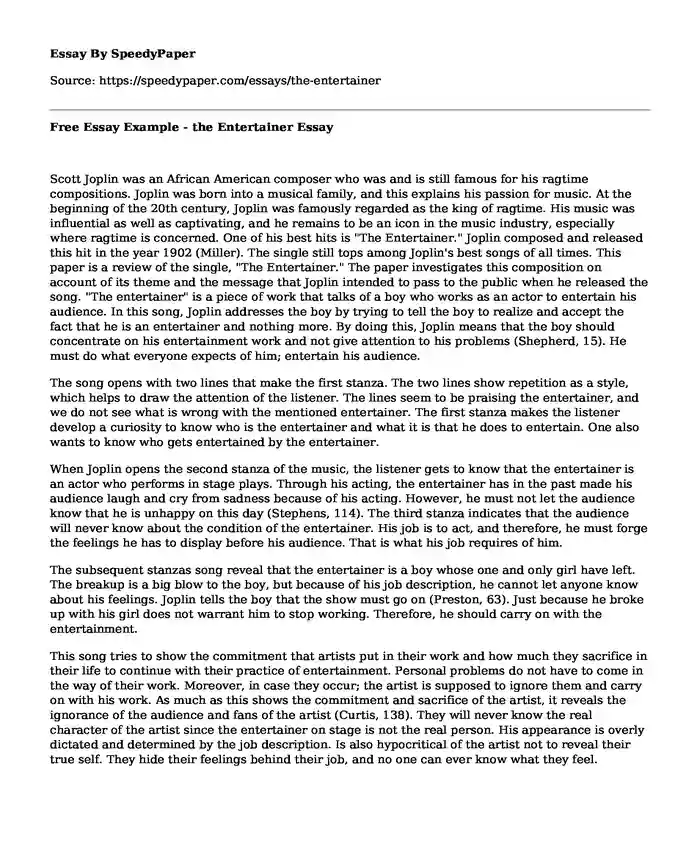
| Type of paper: | Research paper |
| Categories: | Music Entertainment Job |
| Pages: | 4 |
| Wordcount: | 860 words |
Scott Joplin was an African American composer who was and is still famous for his ragtime compositions. Joplin was born into a musical family, and this explains his passion for music. At the beginning of the 20th century, Joplin was famously regarded as the king of ragtime. His music was influential as well as captivating, and he remains to be an icon in the music industry, especially where ragtime is concerned. One of his best hits is "The Entertainer." Joplin composed and released this hit in the year 1902 (Miller). The single still tops among Joplin's best songs of all times. This paper is a review of the single, "The Entertainer." The paper investigates this composition on account of its theme and the message that Joplin intended to pass to the public when he released the song. "The entertainer" is a piece of work that talks of a boy who works as an actor to entertain his audience. In this song, Joplin addresses the boy by trying to tell the boy to realize and accept the fact that he is an entertainer and nothing more. By doing this, Joplin means that the boy should concentrate on his entertainment work and not give attention to his problems (Shepherd, 15). He must do what everyone expects of him; entertain his audience.
The song opens with two lines that make the first stanza. The two lines show repetition as a style, which helps to draw the attention of the listener. The lines seem to be praising the entertainer, and we do not see what is wrong with the mentioned entertainer. The first stanza makes the listener develop a curiosity to know who is the entertainer and what it is that he does to entertain. One also wants to know who gets entertained by the entertainer.
When Joplin opens the second stanza of the music, the listener gets to know that the entertainer is an actor who performs in stage plays. Through his acting, the entertainer has in the past made his audience laugh and cry from sadness because of his acting. However, he must not let the audience know that he is unhappy on this day (Stephens, 114). The third stanza indicates that the audience will never know about the condition of the entertainer. His job is to act, and therefore, he must forge the feelings he has to display before his audience. That is what his job requires of him.
The subsequent stanzas song reveal that the entertainer is a boy whose one and only girl have left. The breakup is a big blow to the boy, but because of his job description, he cannot let anyone know about his feelings. Joplin tells the boy that the show must go on (Preston, 63). Just because he broke up with his girl does not warrant him to stop working. Therefore, he should carry on with the entertainment.
This song tries to show the commitment that artists put in their work and how much they sacrifice in their life to continue with their practice of entertainment. Personal problems do not have to come in the way of their work. Moreover, in case they occur; the artist is supposed to ignore them and carry on with his work. As much as this shows the commitment and sacrifice of the artist, it reveals the ignorance of the audience and fans of the artist (Curtis, 138). They will never know the real character of the artist since the entertainer on stage is not the real person. His appearance is overly dictated and determined by the job description. Is also hypocritical of the artist not to reveal their true self. They hide their feelings behind their job, and no one can ever know what they feel.
Works Cited
Curtis, Susan. Dancing to a black man's tune: A life of Scott Joplin. Vol. 1. University of Missouri Press, 2004. https://books.google.co.ke/books?hl=en&lr=&id=11-58pQzanEC&oi=fnd&pg=PR11&dq=The+theme+of+sacrifice+in+%22the+Entertainer%22+by,+scott+joplin&ots=RFgF3tKOA5&sig=qr5eiw6Uk5VHbJaSiz5ipzkeIxI&redir_esc=y#v=onepage&q&f=false. Accessed July 26, 2019.
Miller, Gray H. "A Profile in Professionalism: The Life of Gibson Gayle, Jr." Hous. L. Rev. 54 (2016): 1299. Avail, https://heinonline.org/hol-cgi-bin/get_pdf.cgi?handle=hein.journals/hulr54§ion=45. Accessed July 26, 2019.
Preston, Katherine, and Katherine K. Preston. Scott Joplin. Holloway House Publishing, 1989. https://books.google.co.ke/books?hl=en&lr=&id=ngXfIXJsm6kC&oi=fnd&pg=PA9&dq=The+theme+of+sacrifice+in+%22the+Entertainer%22+by,+scott+joplin&ots=cHABoVq1X9&sig=Tgy4TmZqcCM1lLY7JGjqdSRfVjg&redir_esc=y#v=snippet&q=entertain&f=false. Accessed July 26, 2019.
Shepherd, John. "The growth of ragtime." Tin Pan Alley. Routledge, 2016. 34-45., https://www.taylorfrancis.com/books/e/9781315623948/chapters/10.4324/9781315623948-9. Accessed July 26, 2019.
Stephens, Daniel. "Classic Ragtime: An Overlooked American Art Form." The Expositor: A Journal of Undergraduate Research in the Humanities 13 (2017). https://digitalcommons.trinity.edu/cgi/viewcontent.cgi?referer=https://scholar.google.com/&httpsredir=1&article=1016&context=eng_expositor. Accessed July 26, 2019.
Cite this page
Free Essay Example - the Entertainer. (2023, Jan 29). Retrieved from https://speedypaper.com/essays/the-entertainer
Request Removal
If you are the original author of this essay and no longer wish to have it published on the SpeedyPaper website, please click below to request its removal:
- Free Essay with a Case Study in Geriatrics
- Cosmopolitanism Essay Example
- Free Essay on the Issue of Racial Discrimination in the Workplace
- Plato's Theory of Form, Free Essay in Philosophy
- Research Proposal Sample on the Effects of the Innovations in the Financial Sector of the US banks
- Free Essay on Serving Veterans as a Mental Health Nurse
- Paper Example on Case Management and Health Care Reform
Popular categories




